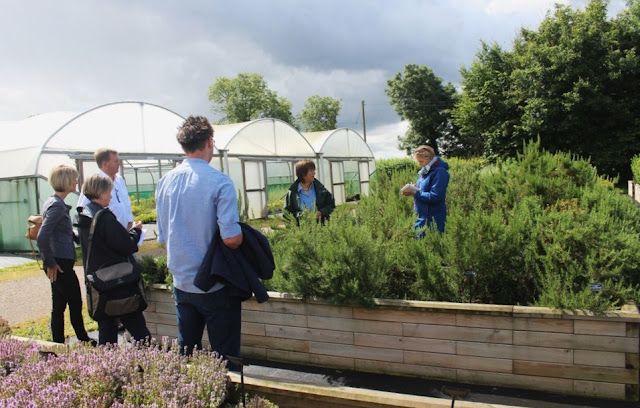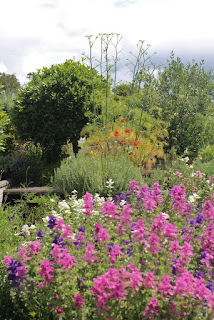Herbs, deluges, and the need for sharp tools
I spent a fascinating study morning at Jekka McVicar's Herb Farm last week, where at last I had the chance to see what's changed since she converted her nursery to a Herbetum in 2013. The presence of herbs with their stories and uses was as strong as ever, with some unexpected additions.
It was a showery day, which turned Jekka's attention to our changeable weather. "We no longer have showers, we have deluges", she said as a particularly sharp one forced us to shelter for a little longer (and eat more delicious cake) before going outside. Jekka's husband, Mac cheerfully fetched a bundle of large umbrellas, so we could continue on our way.
Once outside, "How many of you sharpen your secateurs every week?", was our first and most unexpected question. We shuffled our feet guiltily, and most of us admitted we didn't. "How many of you sharpen your kitchen knives every week?" Now on a surer footing, most of us admitted that we did.
"Hmm, so you sharpen your tools to cut dead things, but you don't to cut living plants. Using blunt tools creates cracks in the plants when you cut, and our deluge-weather means there's an increased chance they'll rot, or succumb to disease". Thus, suitably chastised and chastened, we continued on our tour.
The Herbetum is focused around the Lamiaceae family, an aromatic part of the plant kingdom which contains many of the herbs we use for cooking and other purposes.
This family contains nearly 300 genera and thousands of species, and the Herbetum has around 300 culinary herbs in its raised beds.
It's here we find various basil ("isn't it a dreadful year for growing basil?"), mint ("keep the roots of your mints separate, else they'll all taste the same"), rosemary ("it really is for remembrance"), fennel, savory ("cook it with beans and you won't get any wind"), oregano, marjoram (a particular species within oregano - Origanum majorana), thyme, lemon verbena, lemon balm ("a great stress reliever"), lavender ("the changing weather means we've had to alter our pruning routine - cut back an eighth in August, plus a further cut the next spring"), and many more.
The anecdotes and top tips came thick and fast as we frantically scribbled them down in our notebooks.
As many of you know, the nursery is organic (though no longer registered with the Soil Association), which means the bees Jekka keeps are very happy. They were particularly enjoying the thymes and lavender as soon as the warm sunshine returned.
The thymes were looking particularly perky in the sunshine as many of them were in peak flower. Jekka has around 60 of these (including her own, Thymus 'Jekka') and told us a little about her continued breeding work with this genera. She's focusing on the more mat forming and lower flowering ones, as these are particularly vulnerable to the deluges we discussed earlier. Large amounts of heavy rain means these can easily suffer from crown rot, and her work involves breeding cultivars with more upright flowers so they can set seed.
Of course they can also be propagated and saved via cuttings, but then we hit on the huge subject of the lack of people going into horticulture. Many of the smaller nurseries - like Jekka's - are having problems with staff recruitment, or else they move on quickly once they've acquired the propagating skills that make them attractive to larger employers.
It was a sobering note to end our visit, which was cheered up by the purchase of herbs and lunch in a nearby pub. Now I'm back home, I'm sure Jekka will be delighted I've sought out my garden file and oil, and I now have a set of fully sharpened secateurs*.
* = though in view of the risks to plants Jekka outlined, I'm considering keeping a blunt pair especially for cutting back bramble ;)
Note that Jekka's Herb Farm no longer operates mail order, and only offers direct sales on open days, organised visits, or workshops. Full details of open days and courses are found on the nursery's website.
You may also like: My VP's VIPs interview with Jekka in 2011.














Our lavender was literally buzzing yesterday. Pity that Jekka doesn't do mail order.
ReplyDeleteIt is, but it wasn't working for them. I'm lucky that the nursery's close enough to visit. Just as well, as for some reason I didn't buy the ginger mint I was so taken with!
DeleteIt's a while since I've been there and I've no excuse as my sister lives in the opposite direction off the main road! I loved my visit to the herb farm and found Jekka hugely inspiring and passionate about her plants. I really should go back again soon.
ReplyDeleteLet me know if you're down this way Caro, it would be good to meet up :)
Delete